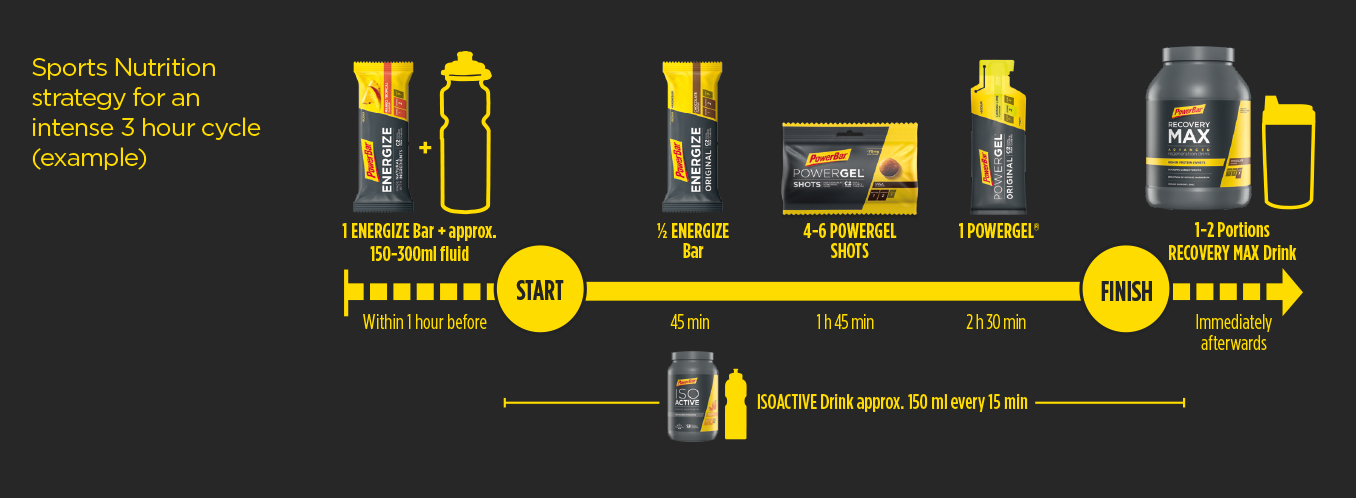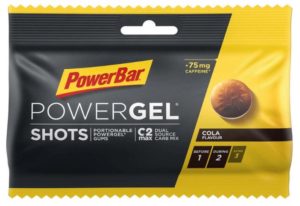14 Jun Sports Nutrition – How to get more out of yourself!
Find your very own sports nutrition strategy!
There is no way past the right sports nutrition strategy if you are chasing your personal best: the intake of the right nutrients at the right time is crucial. But a lot of sports enthusiasts are unsure when it comes to sport nutrition: what should I eat and drink? How much of it? And when?
PowerBar helps you take the next step! We provide you with respective guidance on what to eat and drink before, during and after your ride – based on scientific insights and more than 30 years of experience in sports nutrition.

Please note: everyone is different in this regard! It is important to go step by step to find the best individual nutrition strategy and intensity and duration of the ride is key along with your individual tolerance.
The right carbohydrate and fluid intake during the event is key!
A common nutrition mistake during exercise, alongside a sub-optimal hydration strategy, is either the wrong timing or the wrong amount of carbohydrate intake. Those who want to be able to call on their full performance potential require the appropriate intake of carbohydrates. A carbohydrate intake of up to 60-90g per hour is in general recommended for prolonged events such as White Rose Classic. A mix of glucose and fructose sources is advantageous for very high carbohydrate intakes (70-90g/hour) as it can increase the carbohydrate delivery to the muscles. Studies have shown that this can lead to an improvement in endurance exercise performance >2.5 hours. However, the individual tolerance is a deciding factor when it comes to the optimal amount of carbohydrates!
Carbohydrates can come from various sources, i.e. solid foods and/or liquid/semi-liquid foods and should be individually determined according to personal preference, tolerance as well as the type and intensity of the race. During prolonged endurance activities a combination of solid foods and liquid / semi-liquid foods can lead to a comfortable feeling in the stomach and also offers a welcome change which prevents monotony.
In order to create an individual carbohydrate strategy, one should have a vague idea how many carbohydrates certain foods and drinks contain. For example, a medium sized banana has a carbohydrate content of ca. 25-30g, a gel typically 20-30g per sachet, and 500ml of isotonic sports drink ca. 25-30g. The exact carbohydrate content of foods can be found in the nutrition tables on the product packaging and for loose foods or homemade snacks online calculators can be used.
During the event ensure also a regular and adequate fluid intake. Too much fluid, as well as too little, can negatively affect exercise performance! The actual fluid requirement during exercise depends on various factors such as climate and weather conditions, individual rate of sweat loss and exercise intensity. If you have not tested an individual drinking strategy, the “15-minute rule” can help as a rough guidance: Drink about 150ml of fluid every 15 minutes. Special isotonic carbohydrate electrolyte drinks can enhance water absorption during physical activity. Most importantly, select fluids/drinks that personally suit you best, i.e. which you tolerate well and match your taste.
Be mindful of our nutrition expert’s tips!
No nutrition experiments on the day of competition
Nutrition during exercise can influence a successful performance or drops in performance (in the worst case even a total performance termination). Race nutrition should therefore be planned and tested beforehand. Planned intake of foods and drinks that will be available on the course and that you will bring yourself need to be tested several times during training in order to get a feeling of what should be consumed/drunk in which quantity at which time shortly before and during the race. This can prevent unpleasant surprises.
Do’s and Don’ts before the event
Keep in mind, that every athlete is unique and hence there is no one-size-fits-all nutrition strategy. In general, foods that are more difficult to digest (these especially include foods rich in fat and high in fibre) consumed in the last few hours leading up to the race increase the risk of gastrointestinal discomfort. It’s therefore sensible to avoid salami snacks or fried potatoes or chips with sausages and co. Within the last hour before the race, consuming a carbohydrate-rich snack such as rice cakes, white raisin rolls or sports bars or gels and some fluid can support optimal preparation.
Caffeine – the popular performance booster
Caffeine is considered by athletes to be a performance booster. For example, ingested 60 mins before exercise, a caffeine dose of 3 mg/kg of body weight can increase endurance capacity according to the European Food Safety Authority. However, the effects of caffeine affect individuals very differently. Whether caffeine is useful and tolerable and in what doses before and/or during exercise, should be tried out individually in training.
Look forward to your on-course energy!
 PowerGel Shots Raspberry will be available at selected points during the White Rose Classic to help you fuel your race!
PowerGel Shots Raspberry will be available at selected points during the White Rose Classic to help you fuel your race!
- Easy to portion carbohydrate gums with C2MAX Dual Source Carb Mix
- C2MAX Dual Source Carb Mix contains a 2:1 ratio of glucose and fructose source
- 5 shots deliver about the same amount of carbohydrates as 1 conventional PowerGel®
- Unique taste with liquid gel filling
- No artificial flavours or preservatives (by law)
PowerBar wishes you the best of luck during the White Rose Classic!

Sorry, the comment form is closed at this time.